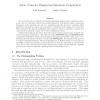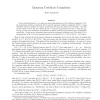10 search results - page 2 / 2 » Computational Power of the Quantum Turing Automata |
FOCS
2007
IEEE
13 years 11 months ago
2007
IEEE
: We study the computational strength of quantum particles (each of finite dimensionality) arranged on a line. First, we prove that it is possible to perform universal adiabatic q...
CORR
2010
Springer
13 years 2 months ago
2010
Springer
We define a new transfinite time model of computation, infinite time cellular automata. The model is shown to be as powerful than infinite time Turing machines, both on finite and ...
CORR
2011
Springer
13 years 8 days ago
2011
Springer
We study the power of classical and quantum algorithms equipped with nonuniform advice, in the form of a coin whose bias encodes useful information. This question takes on particu...
JAC
2008
13 years 6 months ago
2008
Cellular automata are a simple model of parallel computation. Many people wonder about the computing power of such a model. Following an idea of S. Wolfram [16], M. Cook [3] has pr...
JCSS
2008
13 years 5 months ago
2008
Given a Boolean function f, we study two natural generalizations of the certificate complexity C (f): the randomized certificate complexity RC (f) and the quantum certificate comp...


